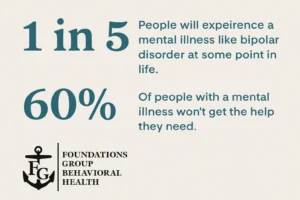The diagnosis didn’t shock her. Not exactly. What shocked her was how quiet the world felt afterward.
She sat on the edge of the exam table, prescription in hand, nodding while her mind spiraled. The psychiatrist’s voice sounded calm, steady, distant. Terms like “mood stabilizer,” “bipolar II,” and “medication management” landed like stones in water. And under it all: the hum of fear.
“What if this changes who I am?”
“What if I lose the fire? The parts of me that are bright and weird and messy?”
“What if I disappear into the diagnosis?”
She’s not alone. If you’re newly diagnosed with bipolar disorder and scared to start treatment—especially medication—you are in good company. At Foundations Group Behavioral Health, we sit with this exact fear every day. Not to push it away, but to honor it. To say: yes, this is big. And yes, you can move through it.
Getting Diagnosed Isn’t the End—It’s the First Honest Beginning
For many patients, getting a diagnosis like bipolar disorder doesn’t feel like clarity. It feels like something heavy has landed on their chest. Instead of answers, it brings new questions:
Was this always there?
Does this mean everything I’ve ever felt was wrong?
Am I still me?
We hear it every week in Cape Cod—especially from young adults, creatives, parents, and high-achievers who have lived in emotional extremes for years. Diagnosis feels like it might erase the self you’ve worked hard to hold onto.
But here’s the truth: diagnosis doesn’t erase anything. It gives shape to suffering. It helps explain what’s been confusing and painful. It gives us a map.
And a map isn’t a sentence—it’s a way out of the woods.
Why It’s So Common to Fear Medication
Let’s say it out loud: medication fear is normal.
Maybe you’ve had bad experiences in the past—meds that numbed you or made things worse.
Maybe you’ve heard horror stories from friends.
Maybe you’re scared of how others will see you.
Or maybe it’s deeper: the fear that meds will take away the spark you’ve always clung to.
Especially with bipolar disorder, that fear gets complicated. Some clients say things like:
- “My best ideas come when I’m hyped up.”
- “What if I lose my edge?”
- “What if this makes me dull, boring, flat?”
You are not alone in thinking that. You’re not being difficult or dramatic. You’re protecting your identity. And that deserves respect.
What Starting Treatment Actually Looks Like
Let’s pull back the curtain.
Starting bipolar disorder treatment doesn’t mean walking into a room, getting a script, and being expected to smile about it. It starts with a conversation. A pause. A real, grounded look at who you are and what you’ve lived through.
In our Cape Cod program, the process usually looks like this:
- A full clinical assessment that includes your story—not just your symptoms
- Slow, collaborative conversations about treatment options (not just medication)
- Exploration of what you’re hoping won’t happen—so we can avoid it
- Time. Space. Reassurance.
We don’t believe in pushing pills. We believe in partnering with people to find out what helps them feel more like themselves—not less.
Medication Isn’t the Goal—Stability Is
Yes, medications are often part of effective treatment for bipolar disorder. But they’re not the goal. They’re a tool—like a light switch in a dark room. They don’t change who you are. They help you see who you are more clearly.
When they work well, here’s what clients say:
- “The noise in my head finally quieted.”
- “I didn’t feel numb. I felt steady.”
- “I could finally tell where I stopped and the illness started.”
At Foundations Group Behavioral Health, we move slowly. We listen. We adjust. And we never assume that one medication works for everyone.
Real Bipolar Disorder Treatment Respects Your Whole Self
We don’t treat symptoms in a vacuum. We treat people. And people are messy, beautiful, layered things.
In our program, your treatment might include:
- One-on-one therapy to explore identity, grief, trauma, and belief systems
- Group therapy for peer validation and social reconnection
- Creative or experiential therapies (art, music, movement)
- Coaching around work, sleep, boundaries, and stress
We’ve worked with clients from Barnstable County and Falmouth who felt terrified to start—who now feel steady enough to parent, create, love, and breathe again.
A Patient’s Story: “I Was Afraid I’d Disappear”
“I waited six months after diagnosis to do anything. I was afraid that if I took the meds, I’d lose my spark. I told my therapist, ‘I’d rather be chaotic than boring.’ But the truth is, I wasn’t chaotic. I was suffering. I was exhausted from holding myself together with duct tape and playlists. Medication didn’t erase me. It gave me back the parts I like—and helped turn down the parts that were hurting me.”
— Client, 2024
What If You’re Still Not Sure?
That’s okay. You don’t have to be sure to begin.
The beautiful thing about treatment is that it doesn’t demand certainty. It invites curiosity. Maybe you won’t take medication right away. Maybe therapy feels like a safer first step. Maybe just talking about what scares you is the move for now.
We’ll meet you wherever that starting line is.
FAQ: Starting Bipolar Disorder Treatment
What if I don’t feel “sick enough”?
You don’t have to hit bottom to deserve care. If you’re struggling to function, connect, or feel joy—treatment can help.
Will medication make me a zombie?
The right medication shouldn’t flatten you. If that happens, we change it. Our goal is stability, not sedation.
Do I have to take medication forever?
Not necessarily. Every case is different. Some people use meds short-term; others long-term. It’s a conversation, not a contract.
What if I’ve tried treatment before and it didn’t work?
That’s more common than you think. Sometimes the diagnosis was off, or the approach wasn’t personalized. We do things differently—starting with listening better.
Can I work, go to school, or parent while in treatment?
Yes. Our outpatient options are designed to support real life while helping you build emotional strength.
You Don’t Have to Be Ready—Just Willing
You don’t need to be sure. You don’t need to be brave every day. You don’t need to have everything figured out.
You just need one moment of willingness. One deep breath. One step toward something steadier.
If you’re newly diagnosed and scared to start bipolar disorder treatment, know this: the parts of you you’re afraid to lose are still here. They’re just waiting for space to breathe again.
Call 888-685-9730 to learn more about our bipolar disorder treatment services in Cape Cod, MA. You don’t need all the answers to take the first step toward feeling better.









